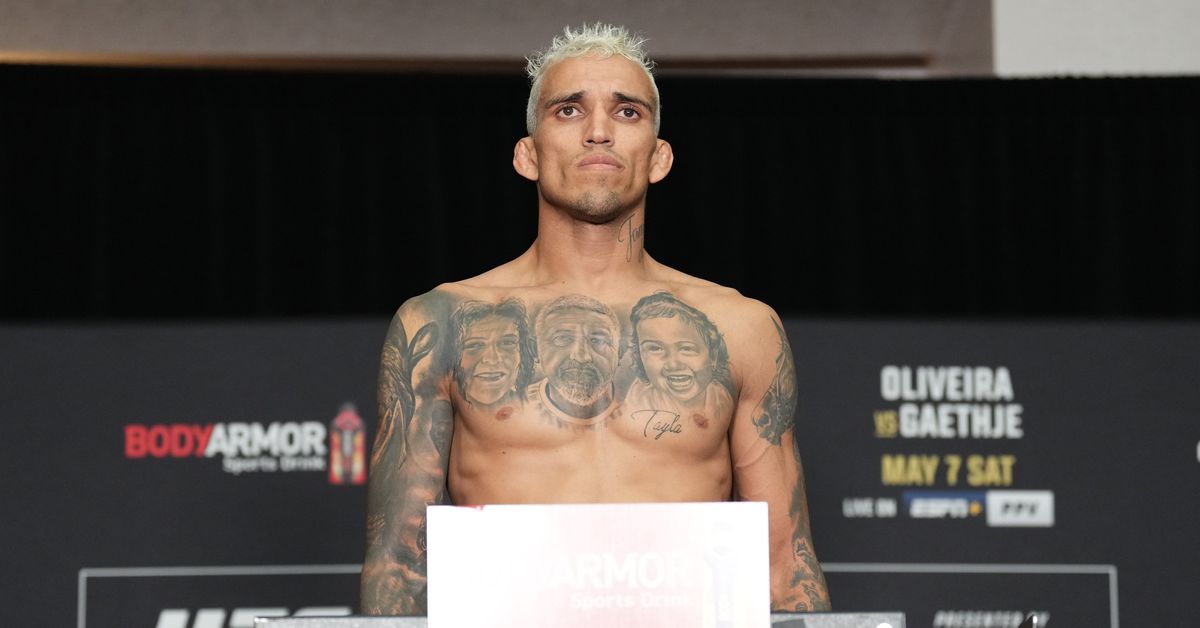Charles Oliveira delivered another stunning performance to cap off UFC 274 this past weekend following a first-round submission over Justin Gaethje but his victory was marred after he missed weight prior to the fight.
Just over 24 hours ahead of the event, Oliveira hit the scale at 155.5 pounds — a half-pound over the limit for a championship bout — and his lightweight title was stripped. Almost immediately after that happened, MMA Fighting confirmed with several sources that the practice scale fighters use to check their weight prior to the official weigh-ins may have been off, which could have been the reason why Oliveira thought he had already hit the mark before being told he was over the limit.
In response to those questions, UFC vice president of regulatory affairs Marc Ratner addressed Oliveira’s issues while also addressing the legitimacy of the scale used at the official weigh-ins.
“The official scale, which was the one they weighed in on Friday with the Arizona Commission between 9 and 11 was when that weigh-in took place, 28 of the fighters made weight,” Ratner told MMA on Sirius XM. “So I’m very, very sure there was nothing untoward on that scale. That scale was accurate.
“What people are talking about, the night before, there’s a scale where fighters can come down and check their weight. Some fighters wanted to change the scale from pounds to kilograms, which you can do, and I think that may have knocked it — and we don’t have proof of anything — but it may have knocked the practice scale out of calibration.”
“I can say for sure that Friday, there was nothing wrong with the official scale.”@MarcRatnerUFC addresses the scale controversy from the #UFC274 weigh-ins.
⬇️ FULL convo w/ @RyanMcKinnell & @AndreasHale out now on the UTC podcast!https://t.co/oiXIxFUXZm pic.twitter.com/qh31ZoMSdH
— MMA on SiriusXM (@MMAonSiriusXM) May 10, 2022
A second scale is used at both the host hotel for the event as well as backstage where fighters can check their weight before standing before a commission official for the actual weigh-ins.
According to Ratner, UFC officials were informed about the problem with the practice scale, which then led to an alert being issued to the fighters just before the official weigh-ins started that morning.
“When we found out there was a problem with the scale early on Friday morning, somewhere around 8 or 8:30 [a.m.], we got another scale that was calibrated and put it out there,” Ratner said.
“When the fighters first came down on Friday morning, they would go to the scale and then they would know if they were a little bit over and they had a chance to lose the weight.”
Unfortunately, Oliveira hit the scale at 155.5 pounds and even after an extra hour to cut the additional half-pound, he was unable to get down to the lightweight limit for the championship fight.
“I am not sure what time Charles or his camp came down on Friday but he’s saying he checked the weight on Thursday night and he was fine,” Ratner said. “I can say for sure on Friday there was nothing wrong with the official scale.”
While Oliveira was ultimately successful in his fight against Gaethje, the weight issue still cost him the UFC lightweight title and now he’s considered the No. 1 contender in the division rather than the defending champion.
As far as addressing this issue for future events, Rather shut down suggestions that the UFC or the athletic commissions should make the change to digital scales.
Rather believes that move could actually cause even bigger issues, which is why he sees no reason to change the current scales used for the UFC weigh-ins.
“Digital scales sometimes you’ll get tenths of ounces, a pound is 16 ounces so you’d hate to have a regular fight and the weight is supposed to be [155 pounds] and you get up to 156 and on the digital scale you could weigh 156.2,” Ratner explained. “Well that doesn’t make sense either.
“We’ve always used the meat scale, it’s accurate, it’s balanced, it’s calibrated, so I have no problem using it. We’ve been successful using it for the past 15 years that I’ve been doing it.”


